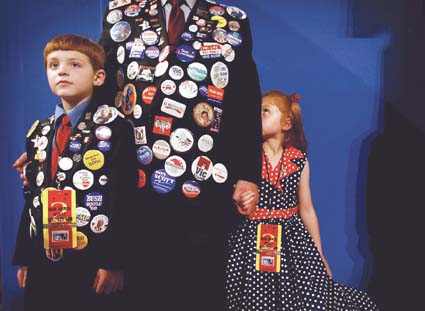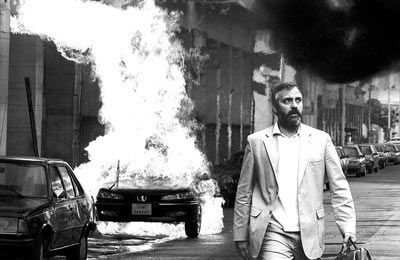 Jean-Paul Sartre warned that one who is merely a "being in the midst of everything" is living a false consciousness.
Jean-Paul Sartre warned that one who is merely a "being in the midst of everything" is living a false consciousness.
For Sartre, passively "being-in-the-midst-of-everything" is behaving as if one has no effect on one’s surrounding, as if one were merely a passive observer… and it is simply not true.
In The Gifts of Hierarchy and Our Comfort with Labelling (Part of the Narrative of Learning Identity Series - June 1999), Jeanne and Susan R. Takata draw an interesting parallel with an analysis that Kenneth Anderson did of the Story of O.
It relates to the aspect of "O's objective of essentially denying autonomy, denying self responsibility in simply passively accepting the trials of violence in the hope that each trial will lead to such abysmal suffering and depths that she will no longer have to choose to consent to this abusive treatment; it will simply be imposed upon her, and she will be safe from responsibility. This is an interesting approach to why one might not flee such abuse, if what one seeks is refuge in the strength of another":The analysis that Anderson did of the Story of O suggests that O was trying to escape the existential angst of individual responsibility in suffering the abuse heaped upon her, in the hope that some abusive act would so demean her that her captors would no longer require her consent to the abuse. Such an attempt to avoid choice is what the existentialists described as man's angoisse. This is one plausible explanation for the non-aggressiveness of the abused, sometimes resulting in the "battered wife syndrome."
I would like to draw a parallel here to any abuse engendered by the arrogance of hierarchy, and I would like to point out that we train for passivity. The whole of behaviorism is based on the assumption that man is passive, that if you wait long enough man, like the pigeon, will do something in the direction you want, and you can reinforce that step, and man will eventually be "conditioned." Our psychology books rarely speak of the rat that refuses to run the maze. We rarely hear mention of the famous white-footed mice. If one assumes the philosophical position that man has will and is responsible for his/her choices, then, like O, man cannot escape angoisse by consenting to that point of abasement at which consent no longer matters, and it is someone else's fault.
"Nonetheless," the author tell us, "rewards are seductive and omnipresent." Alfie Kohn speaks of rewards as punishment. "To condition anyone to accept a reward in response to any performance is to attempt control, to remove choice, to falsely replace 'angoisse' with control. Sartre would say that is not possible. You cannot escape the ultimate essential accounting of your actions."
2004 Republican National Convention in New York City.
Imperialism by any other name:
Wikipedia defines Neo-Colonization as a sort of "unofficial" colonization, in which a country's government is overthrown by a larger country and replaced by a government that coincides with the larger country's interests. In effect, this makes the country a colony, dealing with the problem of a revolutionary uprising by delivering the impression that the colony is still self-governed.Imperialism has been the most powerful force in world history over the last four or five centuries, carving up whole continents while oppressing indigenous peoples and obliterating entire civilizations. Yet, it is seldom accorded any serious attention by our academics, media commentators, and political leaders. When not ignored outright, the subject of imperialism has been sanitized, so that empires become “commonwealths,” and colonies become “territories”… Imperialist military interventions become matters of “national defense,” “national security,” and maintaining “stability” in one or another region.
---Michael Parenti, Empire 101
When your whole world is black:
I see a line of cars and they’re all painted black,
with flowers and my love both never to come back.
I see people turn their heads and quickly look away,
like a new born baby, it just happens every day.
---Paint It Black
...........Rolling Stones, 1966... a good vintage!
The song was featured in the ending credit of Stanley Kubrick's movie about Vietnam, Full Metal Jacket, in 1987.
Syriana, 2005, George Clooney
The song in the videoclip below (a trailer for Metal Gear Solid 4) is an old French cover of "Paint It Black," sung by Marie Laforêt, "Marie Douceur - Marie Colère," in 1966.
In the French cover of the song, written by Michel Jourdan, the lyrics are about a woman's warning that there are two sides to her, a soft side and an angry side:
Marie douceur c'est ainsi que tu me surnommes
Tu crois bien sûr me connaître mieux que personne
Marie colère existe aussi fais bien attention
Je te l'ai déjà dit cent mille fois sur tous les tons
Marie douceur a beaucoup beaucoup de patience
Oui mais un jour tu verras entrer dans la danse
Marie colère avec des éclairs dans les yeux
Je sais lequel aura le plus peur de nous deux
(...)
Marie douceur c'est ainsi que tu me surnommes
Tu crois bien sûr me connaître mieux que personne
Marie colère est maintenant là devant toi
Marie douceur n'est plus qu'un souvenir déjà.
"They hate our freedom" – George W. Bush (2001)
While, here, the lyrics are a warning of a woman to her lover, the song manages to retain a similar feel as the original: Something about the heart of Man (men and women). Something about a deep anguish born of hopeless impotency and helpless anger in the face of oppression or a life of quiet desperation.
"Heav'n has no Rage, like Love to Hatred turn'd,"
---William Congreve, "The Mourning Bride", 1697
Domination and Submission
Posted by
Tom Bombadil
on
11/09/2007
Subscribe to:
Post Comments (Atom)














No comments:
Post a Comment